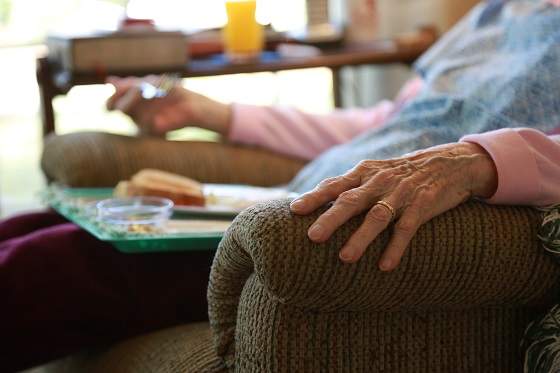If you ask family caregivers, getting their aging loved ones to eat healthier foods can seem nearly impossible. Sadly, this problem isn’t uncommon: One in every eight Americans older than 65 are at risk for malnutrition, according to research conducted by Kaiser Permanente and the National Institutes of Health.
Various physical and mental conditions, as well as medications, can make aging adults less likely to get the nutrition they need to thrive. Whether the enemy is fast food, high cholesterol or a lack of vitamins, here are six ways to incorporate healthier habits (and maybe even some vegetables!) into your loved ones’ lifestyles.
1.Start by Talking
As people age, they may find that their experience with food changes. Physical infirmities, including teeth or stomach issues, can make eating more difficult. Taste buds can go numb, making certain foods unpleasant or inedible.
Talk with your loved one about the things that get in the way of eating well. Ask what foods they like, and what they don’t. Find out what’s easy for them to prepare on their own, if necessary. And take time to help them find new foods that they may be more interested in eating.
Finally, take some time to watch your loved one as they go about their day. When they prepare meals for themselves, where do they struggle? What tasks are most difficult for them? By paying attention, you can find out how to help them prepare food more effectively.
2. Provide Nutritious Foods
Before changing your loved one’s diet, make sure to check with their doctor about their specific dietary needs. Ask about the levels of protein, fat and carbohydrates they need, and for any other specific deficiencies or considerations.
Some of the most important foods for older adults to eat are vegetables, fruits and lean or plant-based proteins. Rather than drinking juice, consider fresh, frozen, canned or dried fruits. The USDA also recommends fortified foods to supplement vitamin D and B12 intake.
3. Make Healthy Foods Easier to Eat
Even if your loved ones are getting the protein and raw foods they need, it’s important to remember other vitamins, minerals and fiber as well. Steaming vegetables and turning fruits into smoothies can make these foods easier to eat. Older adults can also prefer foods with stronger flavors, so be sure to season liberally with spices, garlic and other flavorful ingredients.
4. Shop Together
Spending the time to shop for groceries with a loved one can help you learn their tastes and habits and provide valuable time to talk about their food interests with them. While shopping, family caregivers can provide help in selecting healthy choices.
This can also provide an opportunity to cook together, which may encourage healthier eating. They will appreciate the chance to share a meal with you, and you’ll be helping them eat a little healthier — a win-win!
5. Find Junk Food Alternatives
Aging adults can come to prefer junk food due to their convenience, but these foods are loaded with unhealthy fats, salt and calories that can increase their health concerns. Healthy food isn’t impossible to find, but it can be more difficult if they don’t know where to look.
Work with them to understand how to make healthier choices while away from home, whether that involves choosing different menu options or restaurants. At home, make sure they have healthy snacks on hand, like pre-cut fruits and vegetables.
6. Plan and Prep Meals
While going out to eat can be a fun and important way to help your loved ones feel connected, it can also lead to poor dietary habits and health. Restaurant food is often filled with salt, fat and calories, which may exceed what your loved ones need.
If your caregiving responsibilities include cooking meals for your loved ones, consider planning and preparing meals in advance. This can help save you the hassle of cooking every night and can also make healthy food more accessible. Making large portions of different dishes can help introduce variety throughout the week without having to cook on busier days.
Small Steps Make the Difference
When it comes to introducing healthier habits and better diets for your loved ones, small steps can make that process easier for both of you. Don’t try to do everything at once. Instead, consider suggesting one or two nutritious options per week, and encouraging them to keep up with other important goals, like exercise and hydration. While some older adults can struggle to implement these changes on their own, with a little patience, you can play a pivotal role in helping them become healthier, one step at a time.
